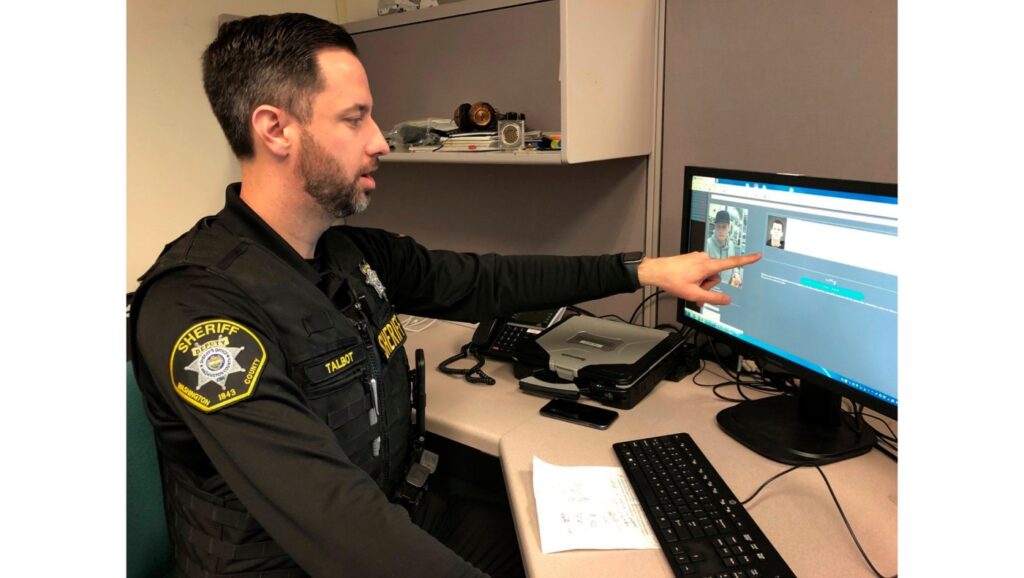
Facial recognition surveillance is a growing threat to constitutionally protected free speech, privacy, racial justice, and information security. We need strict federal, state, and local laws to ban law enforcement’s use of it.
Companies like Clearview AI provide facial recognition services to police with little to no public oversight. Clearview claims to have amassed a dataset of more than 20 billion images by scraping millions of websites, including news media and sites like Facebook, YouTube, and Venmo, without ever seeking users’ consent. The company can even scan for faces in videos on social media sites, not just static photos. Using Clearview’s services, police can identify people in photographs and videos and learn significant, highly personal information about them.
Police abuse of this technology is not just theoretical: it’s already happening. Law enforcement already has used facial recognition on public streets and at political demonstrations to surveil protestors’ First Amendment-protected activities; for example, police in Baltimore and Miami used the technology to identify participants in Black-led demonstrations against police violence. Florida agencies used facial recognition thousands of times to try to identify unknown suspects without ever informing those suspects or their attorneys about the practice. And the Los Angeles Police Department in 2020 barred officers and detectives from using outside facial recognition platforms in their investigations after discovering a handful of detectives had used Clearview without permission.
Law enforcement agencies often argue they must have access to new technology—no matter how invasive to people’s privacy—to help solve the most heinous crimes. Clearview itself has said it “exists to help law enforcement agencies solve the toughest cases.”
But police already use this technology for minor crimes. Officers in Clifton, N.J., used Clearview to identify shoplifters and a good Samaritan, and a lieutenant in Green Bay, Wisconsin, told a colleague to “feel free to run wild with your searches,” including using the technology on family and friends. Officers from coast to coast used it without departmental knowledge or oversight.
Widespread use of facial recognition technology by the government, especially to identify people secretly when they’re out in public, will fundamentally change our society by chilling and deterring people from exercising their First Amendment rights to speak, assemble, and associate with others. Countless studies have shown that when people think the government is watching them, they alter their behavior to avoid scrutiny—a burden falling disproportionately upon communities of color, immigrants, religious minorities, and other marginalized groups.
The right to speak anonymously and associate with others without the government watching is fundamental to a democracy. It’s not just civil liberties groups like the Electronic Frontier Foundation (EFF) that say so: America’s Founding Fathers used pseudonyms in the Federalist Papers to debate what kind of government we should form. And the Supreme Court consistently has recognized that anonymous speech and association are necessary for the First Amendment right to free speech to be at all meaningful.
Clearview has expanded its reach to the battlefield, making headlines by providing its service free of charge to Ukraine. But introducing such technology into the life-or-death realm of a war zone could have significant negative consequences by providing a means for psychological warfare and leading to future abuses that could spiral out of control.
Related Articles
We are the problem in California’s housing shortage
The political consequences of overturning Roe
Do you know who your mayor is?
Little room for optimism in our dire drought situation
Newsom’s playing cynical games with abortion because has nothing to run on
U.S. communities are pushing back. Localities across the nation as well as states including California, Washington, Massachusetts, and New York have enacted bans or moratoria on at least some of the most egregious government uses of facial recognition. And congressional hearings have revealed bipartisan objection to carte blanche use of facial recognition by the police.
EFF continues to support legislation and litigation to curb use of facial recognition. Without an official moratorium or ban in place, police use of this technology is likely to expand throughout our communities.
It’s time to reach out to city councilmembers, county supervisors, and state and federal legislators to demand meaningful restrictions on police use of facial recognition. We need to stop the government from using and abusing this technology to chill our cherished freedoms before it’s too late.
Jennifer Lynch is Surveillance Litigation Director at the Electronic Frontier Foundation, an international digital civil liberties organization based in San Francisco.
